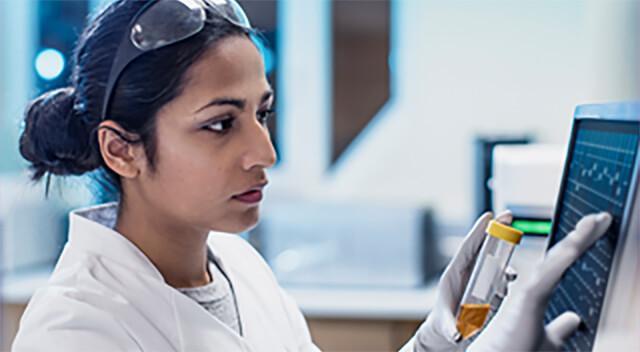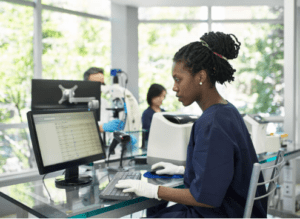
Clinical Laboratory Scientist (CLS) Job Description, Roles/Responsibilities and Qualifications
Clinical Laboratory Scientist job description – Clinical Laboratory Scientists, who are also known as Medical Laboratory Technicians, are responsible for determining the presence or absence of disease in patients and providing data that assists physicians in devising the most effective treatment plan for each individual patient. Managing safety committee meetings, performing validation work and clinical studies for the real-time PCR assay, and managing the validation and implementation of the Laboratory Information Management System for accessioning, testing, and patient result reporting are some of the responsibilities that come with working in this industry. Information Guide Nigeria
Professionals in the field of medical laboratory science, who are also referred to as clinical laboratory scientists or clinical laboratory technicians, are highly trained scientists who determine whether or not a disease is present in a patient and provide data that aids in the diagnosis and selection of the most appropriate treatment for that patient.
👉 Relocate to Canada Today!
Live, Study and Work in Canada. No Payment is Required! Hurry Now click here to Apply >> Immigrate to CanadaEven though they do not frequently interact directly with patients, scientists and technicians who work in medical laboratories play an essential part in the process of providing tailored care to patients. They produce data that is of critical significance for diagnosing and treating a variety of health conditions, including cancer, heart disease, diabetes, and others. Clinical Laboratory Scientist (CLS) Job Description

Read Also: Package Handler Job Description, Roles/Responsibilities, and Qualifications
Responsibilities of Clinical Laboratory Scientists
- Infectious agents such as bacteria, viruses, fungi, and parasites are identified.
- blood analysis to detect diseases such as leukemia, hemophilia, and immunodeficiency
- assessing the presence of antibodies in blood to suggest HIV infection
- Collects, processes, and handles blood and/or other biological specimens in accordance with established procedures; teaches patients about proper sample collection.
- As assigned, conducts a variety of clinical laboratory tests in the fields of hematology, microbiology, immunology, clinical chemistry, and urinalysis; conducts quantitative and qualitative chemical analyses of body fluids such as blood, urine, and spinal fluid; and counts blood using a microscope.
- Performs blood tests for transfusion reasons; may extract blood from a patient’s finger, ear lobe, or vein while adhering to asepsis rules to acquire blood samples.
- As needed, creates and maintains cell/tissue cultures for testing purposes; isolates and identifies specimens using advanced laboratory techniques.
- Quality control is performed on test results to ensure their validity and accuracy.
- Calibration and troubleshooting of testing systems and devices to guarantee adherence to defined accuracy standards.
- Maintains records and reports on outcomes in accordance with established processes.
- Safety, environmental, and/or infection control approaches are used.
- Performs various job-related tasks as given
Aside from performing laboratory tests, the Clinical Laboratory Scientist:
- ensures the accuracy of test data
- compares and chooses suitable laboratory procedures and instruments
- gives doctors information on the validity and significance of test results
- oversees other laboratory workers NYSC Portal
- ensuring blood quality for transfusions
- Collect samples of fluids and tissues from the body.
- Carry out diagnostic procedures on the samples.
- Get the reagents ready.
- Check the accuracy of the results.
- Document results
- Establish criteria for the rejection of specimens.
- Perform and document equipment maintenance
- Observe the rules set forth by OSHA.
Read Also: Property Manager Job Description, Roles/Responsibilities, and Qualifications
Roles of Clinical Laboratory Scientists
Conduct Research and Analysis
Clinical laboratory scientists perform tests on patient samples and fluids from the body to look for any anomalies. In addition to this, they carry out studies in order to uncover their underlying causes and establish the kind and classification of any diseases, illnesses, infections, or other potential factors that may be accountable for anomalous results. JAMB Portal
Maintain Equipment
Clinical laboratory scientists are responsible for the calibration and maintenance of laboratory equipment to ensure that it operates at its maximum potential. This includes maintaining a clean environment for the equipment.
👉 Relocate to Canada Today!
Live, Study and Work in Canada. No Payment is Required! Hurry Now click here to Apply >> Immigrate to CanadaWrite Reports
Clinical laboratory scientists write summaries of various laboratory findings in reports.
Read Also: Sales Representative Job Description, Roles/Responsibilities, and Qualifications
Maintain Logs 15 Best Longrich in Nigeria and their Prices
Laboratory logs are kept by clinical laboratory scientists to keep track of samples and specimens. These logs record the times when materials are transported to different locations within the laboratory so that they may be promptly accessible whenever they are required.
Maintain Lab Safety
Clinical laboratory scientists maintain laboratory safety at all times by adhering to safe handling and quality control procedures and by wearing the appropriate protective equipment. This includes maintaining a sterile laboratory environment to prevent specimen and sample cross-contamination.
Collaborate with Staff
When collecting a variety of specimens and samples, clinical laboratory scientists work together with other members of the laboratory staff and may also communicate with nurses and other medical professionals.
Read Also: Sales Manager Job Description, Roles/Responsibilities, and Qualifications
Clinical Laboratory Scientists job qualifications/skills
Clinical laboratories are looking for individuals with a bachelor’s degree in biology, chemistry, or a similar scientific subject to fill the positions of clinical laboratory scientists. Candidates who have past job experience in a laboratory environment have an advantage over those who do not have this experience since it distinguishes them from the other applicants. Clinical laboratory scientists have the opportunity to participate in a brief, paid training term that teaches them fundamental laboratory protocols and safe specimen-handling methods. Although the length of this training time can vary from lab to lab, in most cases it does not exceed two weeks and is frequently quite brief. Clinical laboratory scientists under training are subject to careful supervision by an experienced member of the laboratory staff or a supervisor. Romantic Love Messages
Clinical laboratory scientists examine and evaluate a wide range of specimens and samples to determine what is generating anomalies. They frequently apply critical thinking abilities and work with other lab personnel. Clinical laboratory scientists with all of the following competencies are hired by labs:
Communication skills: Communication skills, both verbal and written, are essential for clinical laboratory scientists, as they must cooperate with other members of the laboratory staff, write reports, and keep lab data logs. 13 Best Up And Down Dresses in Nigeria and their Prices
Critical thinking: Good critical thinking skills are essential for the work of clinical laboratory scientists, who examine samples and specimens to determine possible causes of abnormalities.
Mechanical aptitude: Clinical laboratory scientists work with a wide variety of laboratory equipment and are responsible for ensuring that everything is in proper working condition. This task demands some level of mechanical aptitude.
Computer skills: Computers are utilized by clinical laboratory scientists in order to have access to digital information and to make notations in digital logs.
Attention to detail: Clinical laboratory scientists pay close attention to every little detail in their work in order to identify even the tiniest deviations from the norm and to record them accurately.
Read Also: Receptionist Job Description, Roles/Responsibilities, and Qualifications
Clinical Laboratory Scientist’s Salary structure in the USA
Clinical laboratory scientists earn a median hourly wage of $31.04, according to PayScale data. According to the Bureau of Labor Statistics (BLS), medical and clinical laboratory technologists and technicians earn a median annual salary of $51,770, or approximately $24.89 per hour. These specialists perform tests and analyses on samples and specimens, similar to clinical laboratory scientists. According to the BLS, employment in this industry will grow 13% through 2026. This pace is faster than the national average for job growth. Clinical laboratory scientists are typically covered by health insurance through their employers. This usually covers dental and vision insurance. Clinical laboratory scientists are usually given compensated sick days, vacation time, and holidays.Good morning my love messages
Check JAMB RESULTS
Check and Confirm: How much is Dollar to Naira








